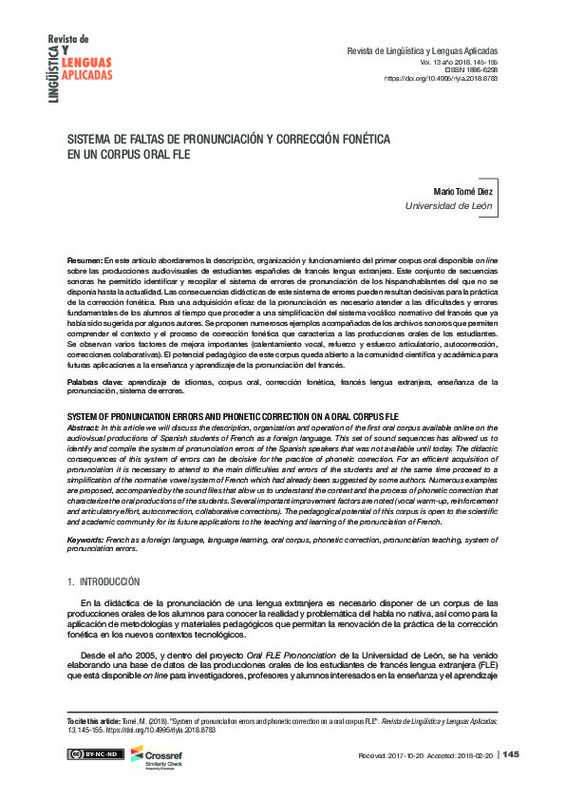Belanger, Y. (2005). Duke University iPod first year experience final evaluation report. Duke University.
Borgia, L. (2010). "Enhanced Vocabulary Podcasts Implementation In Fifth Grade Classrooms". Reading Improvement, 46/4, 263-72.
Burston, J. (2013). "Mobile-assisted language learning: A selected annotated bibliography of implementation studies 1994-2012". Language Learning & Technology, 17/3, 157-225.
[+]
Belanger, Y. (2005). Duke University iPod first year experience final evaluation report. Duke University.
Borgia, L. (2010). "Enhanced Vocabulary Podcasts Implementation In Fifth Grade Classrooms". Reading Improvement, 46/4, 263-72.
Burston, J. (2013). "Mobile-assisted language learning: A selected annotated bibliography of implementation studies 1994-2012". Language Learning & Technology, 17/3, 157-225.
Callamand, M. (1981). Méthodologie de l'enseignement de la prononciation. Paris: Clé International.
Capelle, G., Menand, R. (2009). Le Nouveau Taxi ! 1. Méthode de français. Paris: Hachette.
Companys, E. (1966). Phonétique française pour hispanophones, Paris. Hachette/Larousse.
Ducate, L., Lomicka, L. (2009). "Podcasting: An Effective Tool for Honing Language Students'Pronunciation?" Language Learning & Technology, 13/3, 66-86.
Duflot, C. y Tomé, M. (2005). Cahier de prononciation française. Exercices pour les étudiants espagnols. León: Universidad de León.
Engwall, O., Balter, O. (2007). "Pronunciation Feedback from Real and Virtual Language Teachers". Computer Assisted Language Learning, 20/3, 235-262. https://doi.org/10.1080/09588220701489507
Facer, B., Abdous, M., Camarena, M. (2009). "The Impact of Academic Podcasting on Students: Learning Outcomes and Study Habits". In de Cassia Veiga Marriott, R. and Lupion Torres, P. (Eds.) Handbook of Research on E-Learning Methodologies for Language Acquisition. IRM Press: Cypertech Publishing. https://doi.org/10.4018/978-1-59904-994-6.ch021
Fitria, U., Vianty, M., Petrus, I. (2015). "Using podcast to improve students' listening and speaking achievements". Journal of English literacy education, 2/1.
Hasan, M. M. y Hoon, T. B. (2013). "Podcast Applications in Language Learning: A Review of Recent Studies". English Language Teaching, 6/2. https://doi.org/10.5539/elt.v6n2p128
Hilton, H.E, Osborne, J., Derive, M.J., Succo, N., Bernier-O'donnell, J., Rutigliano-Daspet, S. (2008). Corpus PAROLE: anglais, français, italien L2. Chambéry, Université de Savoie.
Istanto, J., Indrianti (2011). "Pelangi Bahasa Indonesia podcast: what, why and how?" Electronic Journal of Foreign Language Teaching, 8/1, 371-384.
Knight, R. (2010). "Sounds for Study: Speech and Language Therapy Students: Use and Perception of Exercise Podcasts for Phonetics". International Society for Exploring Teaching and Learning, 22/3, 269-276.
Lauret, B. (2007). Enseigner la prononciation: questions et outils. Paris: Hachette.
Lebel, J.G. (1990). Traité de correction phonétique ponctuelle. Les Editions de la Faculté des Lettres, Université Laval. Leon, P., Leon, M. (1964). Introduction à la phonétique corrective. Paris: Hachette/Larousse.
Lee, M. J. W., Chan, A. (2007). "Pervasive, lifestyle‐integrated mobile learning for distance learners: an analysis and unexpected results from a podcasting study". Open Learning: The Journal of Open, Distance and e-Learning, 22/3, 201-218.
Lomicka, L., Lord, G. (2011). "Podcasting-past, present and future: Applications of academic podcasting in and out of the language classroom", in B. R. Facer y M. Abdous (eds.) Academic podcasting and mobile assisted language learning: Applications and outcomes, PA: Information Science Reference, 2011, pp.1-20. https:// doi.org/10.4018/978-1-60960-141-6.ch001
Lord, G. (2008). "Podcasting communities and second language pronunciation". Foreign Language Annals, nº 41/2, 364-379. https://doi.org/10.1111/j.1944-9720.2008.tb03297.x
Lyster, R., Ranta, L. (1997). "Corrective feedback and learner uptake". Studies in Second Language Acquisition, 19, 37-66. https://doi.org/10.1017/S0272263197001034
Lyster, R., Saito, K., Sato, M. (2013). "Oral corrective feedback in second language classrooms". Language Teaching, 1, 1-40. https://doi.org/10.1017/S0261444812000365
Marsden E., Myles F., Rule, S., Mitchell, R. (2002). "Oral French Interlanguage Corpora: Tools for Data Management and Analysis". Centre for Language in Education Occasional Papers, Nº. 58. University of Southampton.
Mettas, O. (1972). Exercices de correction phonétique pour hispanophones. Paris: CREDIF.
McCarty, S. (2005). "Spoken Internet To Go: Popularization through Podcasting". The JALT CALL Journal, 1/2, 67-74. http://journal.jaltcall.org/articles/1_2_McCarty.pdf [fecha acceso 15.10.2017]
McQuillan, J. (2006). IPod in education: The potential for language acquisition. White Paper. http://images.apple.com/ca/education/docs/leaders/Apple-iPodLangAcquisition.pdf [fecha acceso 15.10.2017]
Murphy, J.M. (1991). "Oral communication in TESOL: Integrating speaking, listening and pronunciation". TESOL Quarterly, 25/1, 51–75. https://doi.org/10.2307/3587028
Penfornis, J.L. (2011). Français.com. Niveau intermédiaire. Paris: Clé International.
Putman, S. M., Kingsley, T. (2012). "The Atoms Family: Using Podcasts to Enhance the Development of Science Vocabulary". The Reading Teacher, 63/2, 100-108. https://doi.org/10.1598/RT.63.2.1
Racine, I., Detey, S., Zay, F., Kawaguchi, Y. (2012). "Des atouts d'un corpus multitâches pour l'étude de la phonologie en L2: l'exemple du projet Interphonologie du français contemporain" (IPFC). In: Kamber, A., Skupiens, C. (éds). Recherches récentes en FLE. Berne: Peter Lang, pp. 1-19.
Schmidt, J. (2008). "Podcasting as a learning tool: German language and culture every day". Unterrichtspraxis, 41, 186-194. https://doi.org/10.1111/j.1756-1221.2008.00023.x
Shiri, S. (2015). "The Application of Podcasting as a Motivational Strategy to Iranian EFL Learners of English: A View toward Listening Comprehension". Advances in Language and Literary Studies, 6/3.
Tomé, M. (1994). Fonética francesa para uso de estudiantes espa-oles. León, Universidad de León.
Tomé, M. (2007). "Applications pédagogiques des weblogs dans le Campus Virtuel FLE". Estudios Humanísticos - Filología, 29, 341-373. Universidad de Léon. https://doi.org/10.18002/ehf.v0i29.2822
Tomé, M. (2009a). "Weblogs éducatifs pour l'enseignement d'une langue étrangère". Synergies Espagne, 2, 261-279. http://gerflint.fr/Base/Espagne2/tome.pdf [fecha acceso 15.10.2017]
Tomé, M. (2009b). "Productions orales, weblogs et projet de télécollaboration avec le web 2.0 pour l'enseignement du français (FLE)". Revue ALSIC, 12. http://alsic.revues.org/index1279.html [fecha acceso 15.10.2017]
Tomé, M. (2010). "Ense-anza y aprendizaje de la pronunciación de una lengua extranjera en la Web 2.0". Revista de Lingüistica y Lenguas Aplicadas, 5, 221-239. https://doi.org/10.4995/rlyla.2010.771
Tomé, M. (2011). "Réseaux et médias sociaux sur Internet pour l'apprentissage de la prononciation d'une langue étrangère". International Journal of E-learning & Distance Education, 25/2. http://www.ijede.ca/index.php/jde/article/view/724/1261 [fecha acceso 15.10.2017]
Tomé, M. (2015). "Desarrollo, análisis y evaluación de la producción oral en clase de lengua extranjera con las nuevas tecnologías". Thélème. Revista Complutense de Estudios Franceses, 30/2, 255-268, https://doi.org/10.5209/rev_THEL.2015.v30.n2.48663
Travis, P., Joseph, F. (2009). "Improving learners' speaking skills with podcasts", in M. Thomas (Ed.), Handbook of research on Web 2.0 and second language learning, pp. 313-330. Hershey, PA: Information Science Reference. https://doi.org/10.4018/978-1-60566-190-2.ch017
Wioland, F. (1991). Prononcer les mots du français. Paris: Hachette.
[-]








